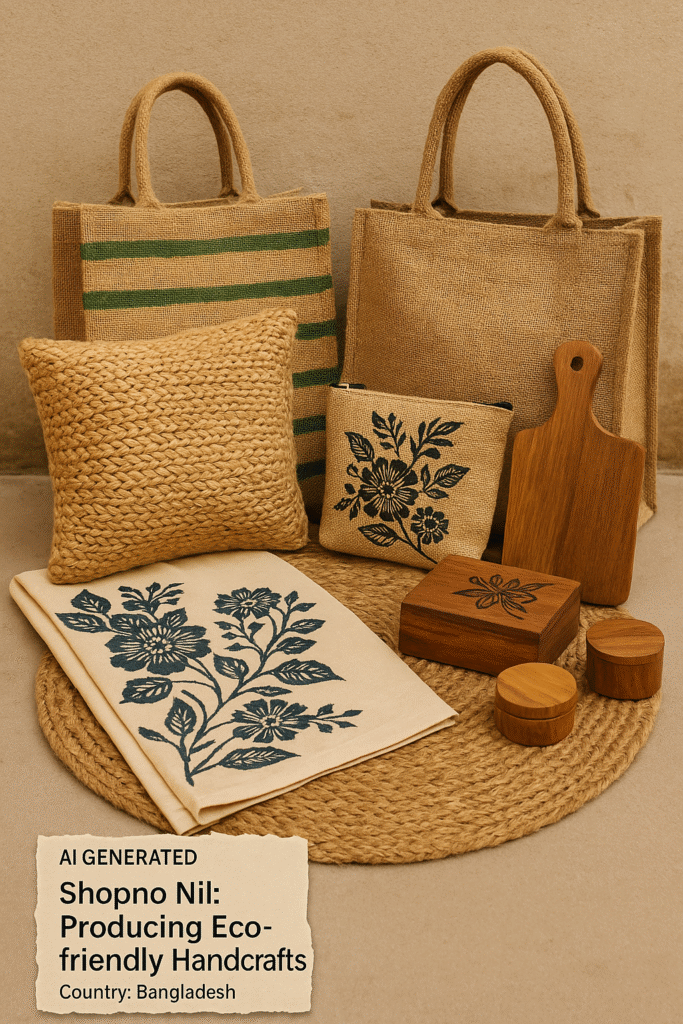
The Problem and Motivation behind:
“I wanted to work with women and show them that they can build something of their own. Many told me business wasn’t for women, but I refused to believe that.” – Tania
Tania (20 years old) grew up in a family of six sisters with no brothers. From a young age, she witnessed firsthand the pressure of being a primary breadwinner. Her family had always hoped for a son to provide financial security, but Tania was determined to prove that women, too, could lead and succeed. In many parts of Bangladesh, women face challenges in finding jobs or starting businesses due to social barriers and limited market access.
Tania and her team wanted to build a business that not only supported women but also promoted sustainability. Inspired by traditional craftsmanship, they launched an initiative to produce eco-friendly handicrafts made from wood and jute[1]., combining local skills with environmental responsibility.
The Innovative Solution
“I was just an ordinary girl with no identity. Now people know me as a business entrepreneur. I feel proud to say I support my family,” – Tania
Through a Design Thinking process, Tania and her team Spoke to women in the community to understand their skills and the challenges they faced in earning a living. At the same time, they saw an opportunity in the growing demand for household and fashion items that were made from plastic and synthetic materials, contributing to environmental degradation. Then, they explored different ideas to produce handicrafts that were both artistic and made fromeco-friendly materials. They created prototypes of their eco-friendly handicrafts to test quality and market response. After selling initial products at a local outlet, they received positive feedback, particularly on the durability and aesthetic appeal of the items.
Tania and her team started with a small outlet on 17th March 2023, and within a short time, the business grew rapidly. Now, they are generating a monthly income of 40,000 to 50,000 BDT (330 – 410 US$), reaching 200,000 BDT (1650 US$) in peak months through increased sales of three types of ecofriendly handicrafts:
- Jute bags & household items – Promoting biodegradable, reusable alternatives.
- Hand-printed materials & saris – Showcasing traditional artistry using natural dyes.
- Wood-based handicrafts – Offering sustainable home decor and daily-use products.
Their success was not possible without the eight craftswomen they have trained and employed as part of their team. These craftswomen gain skills and a source of income, contributing to their financial independence. Tania explains “we train women who have no prior experience and give them jobs. Seeing them earn and gain confidence is my biggest success.” This encouraged other women to approach Tania, asking to learn eco-friendly handicraft skills and join the business.
Lessons Learned and Addressing Challenges:
“I always dreamed of doing something meaningful, but I didn’t know where to start. The Innovation Lab gave me the roadmap I needed.” – Tania
The Youth Innovation Lab (YIL) provided Tania and her team with training and mentorship support that helped them in planning their operations, managing their finances and market their products. Tania credits the lab for teaching her how to plan and take her ideas forward. The YIL provided also market exposure by organising exhibitions where Tania and her team showcased their products. Participating in these fairs helped them to build brand recognition and increased their sales.
Reflecting on her experience, Tania identified three lessons learned:
- Overcoming societal norms that discouraged women from pursuing business – Initially, Tania struggled to convince women to join since no women in her area had previously engaged in business. Tania provided a real example, showing that women can do business and achieve economic independence. As more women saw her success, they gained the confidence to participate. “I started small, but once people saw that I was succeeding, they became curious. Now women come from far-off places to train and work with me,” Tania noted.
- Creating a market for eco-friendly products – At first, customers were hesitant to buy jute bags or hand-printed saris, thinking they were too expensive compared to synthetic alternatives. To overcome this, Tania focused on quality and durability, emphasising that her products were both long-lasting and environmentally friendly.
- Caring about customers’ feedback and continuous improvement –One essential lesson was the importance of adapting to customer feedback. If any items did not sell well, Tania and hear team adjusted designs and introduced new products based on customers’ suggestions.
Next Steps and Future Aspiration:
“I want to build more shops where women feel safe, respected, and empowered. My vision is to take our products beyond Bangladesh, showing the world what women here can achieve.” – Tania.
Tania dreams of expanding Shopno Nil beyond her local area. She plans to:
- Set up more outlets in other districts to reach new markets.
- Explore opportunities to export products internationally, showcasing Bangladeshi craftsmanship to a global audience.
- Continue empowering women by offering more training sessions and including marginalised groups.
[1] Jute is a natural fibre that comes from plants, mainly grown in countries like Bangladesh and India. It looks like long, rough strands and is often called the “golden fibre” because of its colour and shine.